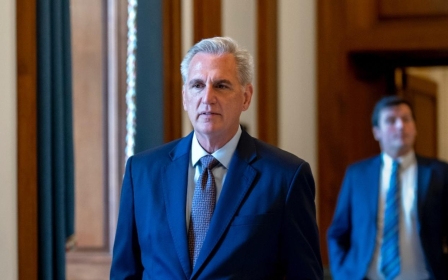US ambassador to Israel Tom Nides to leave post

US ambassador to Israel Tom Nides will leave his post over the summer at a time of complicated relations between Washington and Israel over the country’s judicial overhaul and rising tensions in the occupied West Bank.
The move was first reported by Axios, which cited two US officials saying that Nides decided to leave his post for personal reasons after being away from his family since December 2021. Nides informed senior staff at the US embassy on Tuesday about his planned departure, the site said.
“Tom has worked with characteristic energy and skill to further strengthen the special bond between the United States and Israel, and to advance US diplomatic, economic, and security interests," Secretary of State Antony Blinken told Axios.
A US official told Axios that Nides informed the Israeli prime minister's office on Monday evening before Israel launched new air strikes on the besieged Gaza Strip.
Middle East Eye reported from Gaza City how an Israeli fighter jet targeted the entire floor of a residential building in the city. Fifteen Palestinians were killed in the attack, including three Palestinian Islamic Jihad members, four children, and four women.
New MEE newsletter: Jerusalem Dispatch
Sign up to get the latest insights and analysis on Israel-Palestine, alongside Turkey Unpacked and other MEE newsletters
Nides’ departure comes as tensions flare in the occupied West Bank and Gaza.
Earlier this year, CIA director William Burns warned that violence in the region was beginning to resemble the Second Intifada. US officials have tried to quell the fighting, most recently by hosting a summit in the Jordanian resort city of Aqaba, but there has been little sign of progress.
Nides was well-regarded across Israel’s political spectrum. But following Netanyahu’s return to power last year, he had to navigate fraught ties with members of Israel’s far-right government.
In November he warned the White House would “fight any attempt” by Israel to annex parts of the occupied West Bank, which members of Netanyahu’s government - including finance minister Bezalel Smotrich and national security minister Itamar Ben-Gvir - have advocated for.
In a sign of the tensions, the US in February equated any transfer of civilian authorities in the occupied West Bank to Smotrich as a step toward annexation.
Later, when the finance minister called for the Palestinian town of Huwwara to be wiped out, the US slammed the comments as “disgusting”.
'Pump the brakes'
Israel is the US’s closest Middle East ally and the country receives around $3.8bn a year in military aid from Washington. But the American ambassador has also had to walk a fine line amid Israel's domestic political turmoil.
Following mass protests in Israel over a contentious judicial reform, US President Joe Biden made a rare foray into Israel’s domestic politics, saying that he supported a compromise in the spat.
In February, Nides said in a podcast, “We’re telling the prime minister, as I tell my kids, pump the brakes”. He added, “Slow down, try to get a consensus, bring the parties together”.
According to Axios, Nides delivered harsh warnings to Netanyahu about the plan, and on 27 March delivered a personal message from Biden demanding that Netanyahu suspend the judicial overhaul.
Stephanie Hallett, the deputy chief of mission at the US embassy in Israel, is slated to serve as charge d’affaires once Nides steps down, according to Axios.
But filling the role of a full-time ambassador could be a lengthy process, given the political discord in Washington.
US ambassadors are appointed by the president and confirmed by the Senate, where Biden’s Democratic Party has a slim majority.
The post of US ambassador to Israel is heavily scrutinised in Washington, given the sway of the Israeli lobby and the close relationship between the two countries.
Nides, a former Morgan Stanley executive, is a longtime Democratic insider having served former President Barack Obama. He is seen as close to former White House chief of staff Ron Klain and current chief of staff Jeff Zients, along with Blinken and national security advisor Jake Sullivan.
Middle East Eye delivers independent and unrivalled coverage and analysis of the Middle East, North Africa and beyond. To learn more about republishing this content and the associated fees, please fill out this form. More about MEE can be found here.





